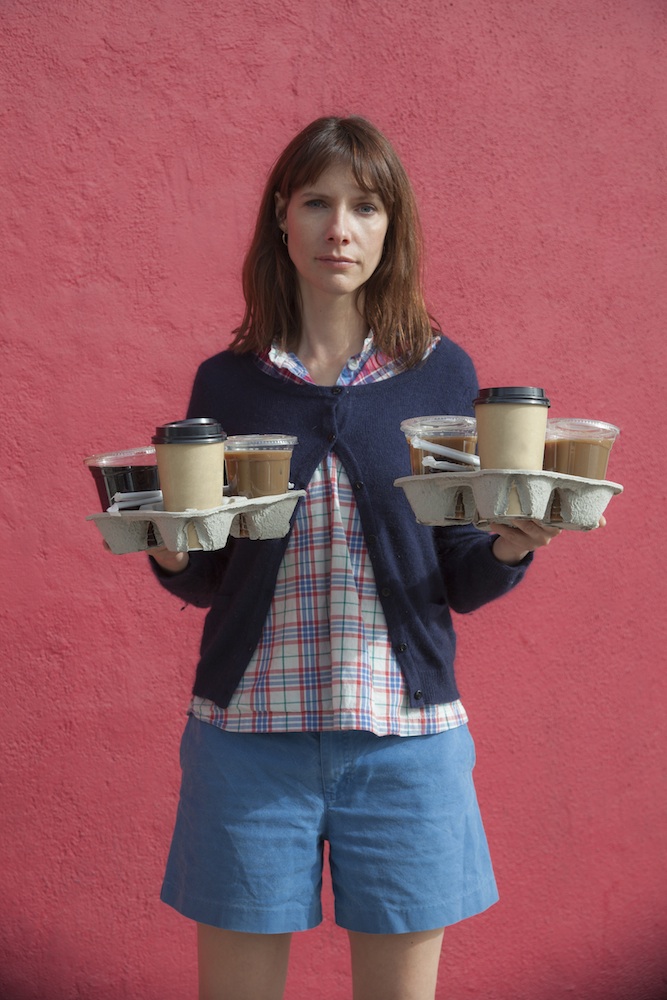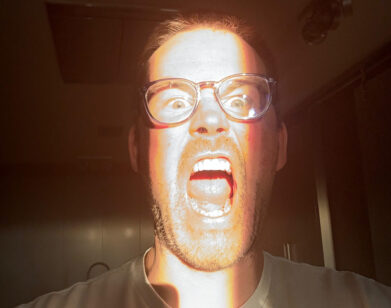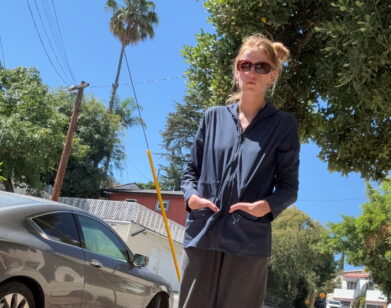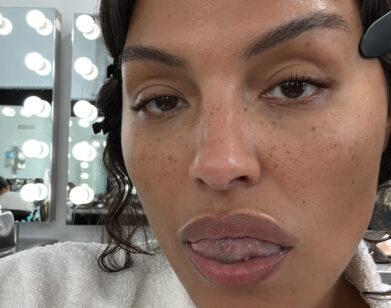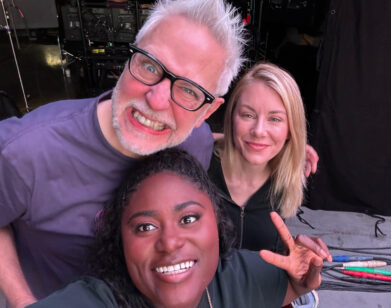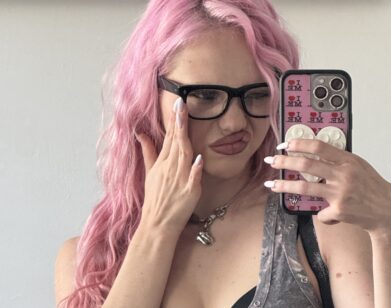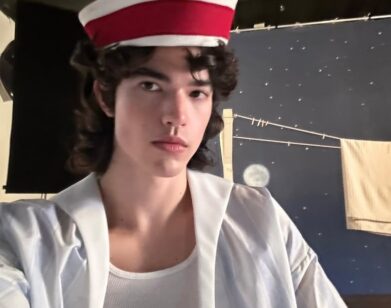Two Best Friends
ABOVE: DOLLY WELLS (LEFT) AND EMILY MORTIMER. PHOTOS COURTESY OF MISCHA RICHTER/HBO.
“Really, we were shamed into it,” says actress Emily Mortimer of Doll & Em, the series she co-wrote and stars in with Dolly Wells. “For 10 years, we had been telling people that we were writing a script together, and it was starting to make people suspicious,” she continues. “It was amazing how quickly everything happened once we had quite a simple, good idea, which was, what happens when you make your best friend your personal assistant?”
The premise of Doll & Em is not novel: having just broken up with an overly critical boyfriend, waitress Dolly seeks refuge in L.A., where her childhood best friend Emily is shooting a film. When it is time for Dolly to go home to London, Emily offers to let Dolly stay on as her assistant. Within 24 hours, Emily is asking Dolly to fetch her “extra frothy” lattes at six in the morning. But, even when jealousy and insecurities get the better of them, it is clear that the characters of Dolly and Emily have a genuine affection for one another. The way they address one another feels like they’ve been doing it for decades, and they have. Like the characters they have lent their names to, the British actresses met as children and have been friends ever since.
In spite of some superficial shared details, however, Doll & Em is not autobiographical. “Our fictional selves are probably slightly less foolhardy than we are,” notes Mortimer. “We are guilty of some of the same crimes as our characters, but there’s very little resemblance to the way that we get along with each other, apart from a recognition that these people know each other very, very well.” Quite a few recognizable actors make cameos throughout the six-part series, but it is as Entourage-esque versions of themselves: Susan Sarandon appears with a fictional young son and boyfriend. While in real life, Mortimer is married to actor Alessandro Nivola and has a son and a daughter; in the series, it is Wells’ husband, photographer Mischa Richter, and two children who appear as Emily’s family.
“The one thing we do have in common with our characters is that we act before we think,” says Mortimer. “If we’d thought about it and given it too much time, we wouldn’t have probably called ourselves ‘Doll’ and ‘Em,’ we wouldn’t have included all of our extended families.”
“My husband didn’t have long enough to think, ‘Okay, this is a crazy idea,’ ” jokes Wells.
EMMA BROWN: How old were you when you first met?
EMILY MORTIMER: We were four-ish.
DOLLY WELLS: Four or five?
MORTIMER: Our parents were friends with each other. Our dads were both writers—they wrote sort of satirical, comic things as well as more dramatic things. Dolly’s dad and my dad were socially friendly, and so we would hang out together as children through our parents. From an early age we were acting out scenes from Coronation Street, which was a long-running soap in England, set in a pub in Northern England.
BROWN: With Northern accents?
WELLS: Yes. It was with very bad Northern accents. In fact, we just kept it to two lines: [with Mortimer in a Northern accent] “I don’t really know, Mavis!”
MORTIMER: And we would pretend to drink pints of beer and sit in a pub and make our parents watch it.
WELLS: We used to say it was kind of an open piece of performance art: anyone could come at any point and have a look. We didn’t really mind.
BROWN: Were your parents encouraging? Or were they exasperated by the whole thing?
WELLS: My dad was an actor, so he would try and put me off and say, “Come on, you’ve got to go to university first.” And I think Em’s dad loved actors, didn’t he Em?
MORTIMER: Yeah, he really admired them. He never put me off. I would ask him and blame him in years to come: “I thought a parent’s job was to tell their children not to go into acting as a profession!”
BROWN: Is that what you tell your children?
MORTIMER: [laughs] Yes.
WELLS: [laughs] I keep saying to my daughter, “If you’re going to do it, you’re going to wait until you’re a grown up!” But it hasn’t worked, she’s got the part of Dogberry in Much Ado About Nothing at school, and she’s so excited, I don’t know how long we’ll be able to put her off.
BROWN: Were you always as close as you are now?
WELLS: We went to different schools and different universities, so we were still we were still friends but we didn’t become—
MORTIMER: Best friends until—
WELLS: About 21.
MORTIMER: There are four of us—two other friends that we’ve all grown up with. Doll and I didn’t get really, really close and find as much as we now have in common until our 20s.
WELLS: When we left university we were both back in London, both acting, both falling in love with American soon-to-be husbands.
BROWN: If you do another season, you should bring in your other two childhood friends.
MORTIMER: We just came back from London, from doing a three-day press junket, and had that awful feeling of having spoken way too much about yourself—we were both just feeling slightly sickened by ourselves. So we called our other two best friends up to say goodbye, and I was telling one of them, “At this point, the phrase ‘Doll and Em’ just makes me want to gag,” and she was like, “God, it makes me want to gag too.” So I feel like it may have already run its course. The risk of doing something with your best friend is other people getting sick of us, and us getting sick of each other and ourselves.
BROWN: In the series, Emily is filming a movie described as “the female Godfather.” How did you come up with that?
MORTIMER: We were ripping on the notion of, or the complicated idea of, what it is to be a strong woman. How all of us long to be given these incredible opportunities—
WELLS: And prove ourselves as strong women.
MORTIMER: We just found it amusing this idea of getting the role of a lifetime, and everyone telling you how lucky you are, how amazing it is, what a feisty, brilliant character you are. The more they tell you what a strong woman you’re playing, the more you feel hopeless. There are some complex emotions that come with being endowed with that kind of responsibility. You start thinking, “Am I strong enough to play a strong woman? Am I good enough to be a strong woman? Do I actually really want to be a strong woman?” [laughs]
WELLS: It’s more a name that men call women—”strong woman.”
MORTIMER: So we were sort of thinking about the ultimate role for a “strong woman,” and it was the “Godmother.” [laughs]
WELLS: We didn’t want to make it a ludicrous, ridiculous film, because you didn’t want to think that Em’s character would be in some terrible film.
MORTIMER: We wanted to make it seem like the director could be a sort of genius.
WELLS: We wanted it to be something that could actually be a brilliant film.
MORTIMER: It probably wasn’t. It was probably going to be quite pretentious and bad, but who knows? There’s that hovering doubt that’s going around a set, where they don’t really know whether they’ve got faith in you, and you don’t really know whether you’ve got faith in them. Everybody’s feeling slightly paranoid: Maybe the whole thing’s going to turn into something wonderful, and maybe it’s not.
BROWN: In one episode, your characters go to a party with Susan Sarandon, and she has a confrontation with Dolly and Em isn’t particularly helpful. Have you ever had that sort of encounter in real life, where someone you admire starts yelling at you?
WELLS: I can remember sitting with a quite well-known actress—Em and me and her sitting around—and we were spending a very long amount of time listening to her talking about herself and her life, I felt like it was definitely a couple of hours. Then I chimed in with, “I agree, I think that’s sort of true” and she went, “You, should listen more.” [laughs] And then she left the room, and I looked at Em with sort of fear, like, “Oh my God, is this what it’s like?” But that’s not a brilliant story, ’cause I can’t tell you who it was.
MORTIMER: It is the idea of that hot feeling of just being told off by somebody who’s really, really famous and amazing.
WELLS: Not only that, but that your best friend would just jump ship immediately. In real life if that happened, I know that Em would not take the side of the other person. Em’s character is so impressed by Susan Sarandon, who feels like she should be playing the part Em’s playing. Em feels sort of fake anyway, so all she’s thinking is, “God, this is Susan Sarandon, she probably thinks I’m hopeless,” so she doesn’t immediately leap to my defense.
BROWN: There are a lot of wonderful guest stars in the series—Susan, but also Andy Garcia, John Cusack, etc. Did you write the roles with those actors in mind?
WELLS: We knew we wanted Susan Sarandon for Episode Two—that was sort of a dream. We wanted this strong, beautiful, cool, brilliant actress that Em could feel threatened by to play that part. We had a wish list, and we were incredibly, incredibly lucky to get everyone that we wanted. They were all so funny and generous and cool and kind.
BROWN: Were they people you’d never met before?
WELLS: Chloë [Sevigny] is a really good old friend of my husband’s, and we sent her the pilot and she loved that. And then Susan Sarandon we had both met at Sundance when we were writing and coming up with the idea of it and she was promoting a film.
MORTIMER: We had a really fun night together, just going around Sundance, and so we felt brave enough to send her the teaser in hopes that she remembered hanging out with us!
WELLS: And then John Cusack, Em’s agents remembered that he really wanted to work with her.
MORTIMER: I’d met him a couple of times in professional meetings, but we hit it off, and so I felt comfortable asking him at least. Andy [Garcia] and I had done this film, City Island (2009), together and I loved Andy, he’s just such a sweetheart. It fit in so well with the “Godmother” having him there. And then Noel Fielding, who’s a big star in England and a very loved and respected comedy writer and performer, worked with Dolly a lot. He’s the guy in the last episode that comes up tells us that he wants to have a bath with us.
WELLS: [laughs] And then there’s Ben Chaplin, who we knew and were really good friends with.
MORTIMER: For so much of it we are so indebted to others. [Azazel] Jacobs, the director had more of the sensibility of a filmmaker than a director-for-hire for a television series. When we first had the idea, he made us shoot a 20-minute teaser together in L.A., without any kind of costumes or makeup or any kind of crew. [Azazel] did it with a boom, in my trailer, and he brought his friend [Daniel Lynn], the brilliant DP, to be the director of photography and to shoot it. We wrote down some ideas for scenes and sort of improvised them together for the teaser, and then when we edited it together afterwards, he said, “This is a pilot. We should show it to people as such.” And we did. We got Sky in England to commission it from that. We were able to show it to all these people, these incredible actors. I think there was something about the aesthetic sensibility of it that others sensed in his filmmaking style that made them feel very comfortable saying yes and made them feel in safe hands. I know as an actor, that’s all you want to know: How the director’s going to manipulate the material, and what kind of a world you’re going to enter into. You just wish with everything you did that there was a 20-minute teaser to show you what it was that you were getting yourself into! I think that really sealed the deal with our cast.
DOLL & EM PREMIERES TOMORROW NIGHT, MARCH 19, ON HBO.

